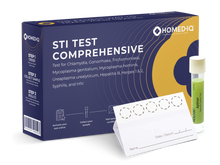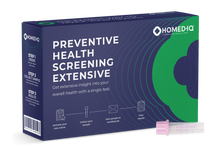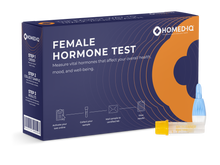Cornelia Grabmeier holds a BSc in Biology, specialising in neurobiology, from Ludwig Maximilian University of Munich, and is currently pursuing an MSc in Management, Policy Analysis and Entrepreneurship in Health and Life Sciences at Vrije Universiteit Amsterdam. She has completed several research internships, including at the Technical University of Munich Hospital, where she investigated the effects of anaesthetic agents on sleep-wake cycles, and at the Leiden University Medical Centre, where she developed a sandbox for digital health technologies. Cornelia is passionate about making science accessible to a wide audience and inspiring them by communicating fascinating topics. She combines her academic expertise with hands-on research experience to ensure the accuracy and clarity of her work.
Pregnancy and sexually transmitted infection
Pregnancy is a time of joy and anticipation – but also a phase in which the health of the expectant mother and the unborn child must be especially protected. Sexually transmitted infections (STIs) play a central role in this: they can go unnoticed and have serious consequences for both mother and child. In this article, you will learn which STIs can occur during pregnancy, what risks they pose, and how you can effectively protect yourself.
Table of Contents
- Which STIs can occur during pregnancy?
- How can STIs affect pregnancy and the unborn child?
- Which STIs are tested for during pregnancy?
- How are STIs diagnosed during pregnancy?
- What treatment options are available for STIs during pregnancy?
- How can you protect yourself from STIs during pregnancy?
- Summary
Which STIs can occur during pregnancy?
The sexually transmitted infections (STIs) that can occur during pregnancy do not differ from those affecting non-pregnant women. These include chlamydia, gonorrhea, syphilis, HIV, genital herpes, trichomoniasis, hepatitis B, hepatitis C, and human papillomavirus (HPV). What makes them particularly concerning is that these infections can have especially serious consequences for the health of the mother and the unborn child during pregnancy (CDC, 2024).
How can STIs affect pregnancy and the unborn child?
Infections with STIs during pregnancy can have significant effects on the health of both mother and child. Depending on the timing and type of infection, they can lead to a range of complications for the unborn child:
- Low birth weight (less than 5 pounds)
- Eye infection
- Pneumonia
- Infection in the baby’s blood
- Brain damage
- Poor coordination of body movements
- Blindness
- Deafness
- Acute hepatitis
- Meningitis
- Chronic liver disease, which can lead to liver scarring (cirrhosis)
- Stillbirth
Source: NIH, 2019
Which STIs are tested for during pregnancy?
Testing for sexually transmitted infections (STIs) is an important part of prenatal care. Early diagnosis and treatment can significantly reduce—or even prevent—the risk of transmission from mother to child. As part of routine examinations, tests for chlamydia, gonorrhea, HIV, and syphilis are typically performed. If there is an increased risk or special medical indication, additional tests may be conducted to best protect the health of both mother and child (Bundesministerium für Gesundheit, 2024; Deutsche Apotheker Zeitung, 2024).
How are STIs diagnosed during pregnancy?
STIs during pregnancy are diagnosed using specific tests. These include blood tests (e.g., for HIV, syphilis, and hepatitis B), cervical or vaginal swabs (e.g., for chlamydia and gonorrhea), and urine tests (e.g., for trichomoniasis). These tests are part of prenatal care and enable early treatment (MedlinePlus, 2024).
Discreet home tests such as the Basic 4 STI Test, the Chlamydia and Gonorrhea Test, or the STI Test Plus from Homed-IQ offer a convenient way to detect infections early. These tests can be easily performed at home and support timely treatment.
What treatment options are available for STIs during pregnancy?
Treatment options for sexually transmitted infections during pregnancy vary depending on the type of infection. Antibiotics such as azithromycin or penicillin are commonly used to effectively treat bacterial infections like chlamydia or gonorrhea. For viral infections such as HIV or herpes, antiviral medications like acyclovir or antiretroviral therapies are used. Vaccinations are another preventive option, for example to prevent the transmission of hepatitis B to the child. The choice of therapy is always tailored to the mother’s health and the safety of the unborn child (NIH, 2019).
How can you protect yourself from STIs during pregnancy?
During pregnancy, protecting your health and that of your unborn child is a top priority. With simple yet effective measures, you can significantly reduce the risk of sexually transmitted infections:
- Use condoms: A reliable form of protection that significantly lowers the risk of infection.
- Attend regular prenatal checkups: Early detection and treatment of infections protect both mother and child.
- Get tested for STIs before or at the beginning of pregnancy: For a safe start to this special time.
- Commitment and trust in your relationship: Reduces the risk of new infections and strengthens your bond.
- Vaccinations before pregnancy: Vaccinations (for example against HPV) provide preventive protection against specific pathogens.
- Open communication: Share your concerns and questions with your partner – together you can ensure your sexual health.
These measures support you in having a healthy pregnancy and giving your child the best possible start in life.
Summary
Sexually transmitted infections during pregnancy can endanger both the mother and the unborn child and may lead to miscarriage, developmental disorders, and birth complications. Routine testing and early treatment are essential to minimize these risks. Protective measures such as condom use, regular checkups, and open communication allow expectant parents to actively contribute to their sexual health.









